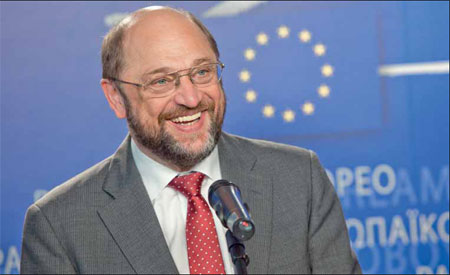The man most likely
Updated: 2013-12-20 10:08
By Martin Banks (China Daily Europe)
|
|||||||||||
|
Martin Schulz believes the relationship between Europe and China is on the up curve. Provided to China Daily |
Tipped to be the next president of the European commission, Martin Schulz looks forward to working with China
He could be the next president of the European Commission, arguably the most powerful job in the European Union.
After what many believe to be a successful stint as president of the European Parliament, some would suggest German politician Martin Schulz is now ready for the weightier role of succeeding Jose Manuel Barroso as top man at the commission.
Schulz has received the support of 21 Socialist member parties across Europe, and his nomination as the official Socialist candidate in the appointment of the next commission chief is expected to be rubber-stamped at the pan-European party's electoral congress in Rome on March 1.
As potentially Europe's next most powerful politician, what he thinks about EU-China relations matters, and on this he is generally positive.
"I think EU-China relations are healthy," he says. "We celebrated this year the 10th anniversary of our EU-China Comprehensive Strategic Partnership and the 25th anniversary of the opening of our EU Delegation to China. China is now the EU's second-largest trading partner and the EU is China's biggest trading partner. The EU is also beginning to exit the crisis, and this is good news for China's exporters.
"Yet relations could be even healthier. There is a problem among EU member states which, in order to ingratiate the Chinese leadership, keenly hide the issues of friction between the EU and China under the carpet, and actually trade and blame EU institutions of complacency.
"This strategy might pay off in the short run, but it is bankrupt in the long run. We need not to shy away from confronting our divergences. This is the basis for a relationship based on mutual respect and openness."
Turning to trade disputes between the two sides, he says, "I do not know anyone in Brussels who wants to shut China off behind a bamboo curtain of trade barriers, but the opening-up of our markets needs to be reciprocal and take place on a level playing field."
One issue "very dear" to Schulz is health and safety at work, and he says the recent tragedy involving Chinese factory workers in Italy "reminds us of the urgency for Europe to ensure that our own house is in order".
"It also reminds us of the necessity to make sure that these standards are respected worldwide," he says. "I think reinforcing international organizations, like the WTO or the ILO, is the best way to defuse our trade tensions. The recent agreement in Bali reminds us that this path is possible and must be pursued in the interest of all."
He believes the spat over solar panels has been largely diffused.
"I can only stress that member states need to understand that we cannot afford to be driven into a game of divide et impera. This is true for any policy area, whether we talk about climate change or trade.
"Our divisions make us collectively and individually weaker vis-a-vis third partners."
Looking to future EU-China relations, Schulz believes the policies that emerged from the Third Plenum of the 18th Central Committee of the Communist Party of China last month "reflect the wider ambitions of a new Chinese leadership, which has the willingness and strength to tackle directly the challenges China is confronted with".
These, he says, range from the demographic challenge to opening up to social organizations.
"In this sense we easily see the relationship with Europe being on the up-curve. If our increased interdependence proceeds in parallel with increased trust, I see a prosperous future."
Today's Top News
Chinese merchant killed during robbery in Russia
IPR courts 'would be helpful'
Liaoning's combat capability tested
GM corn rejection not to hurt market
US aircraft hit by gunfire in South Sudan
Memorials mark Lockerbie attack
H5N2 outbreak confirmed in N China
China's moon rover works stably
Hot Topics
Lunar probe , China growth forecasts, Emission rules get tougher, China seen through 'colored lens', International board,
Editor's Picks

|

|

|

|

|

|






